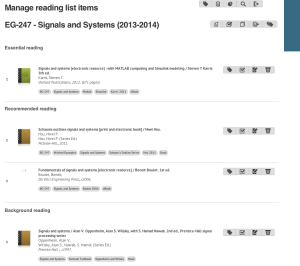The course reading list in iFind Reading
My second step in setting up my new module was to update the reading list.
There are a large number of books on Signals and Systems and some, like the ones recommended by my colleagues last year, are considered seminal. However, they are also very expensive and available in the library in small numbers and only on short-term loan. They also take a somewhat mathematical approach to the subject.
One of my aims for the course is to attempt to make it more accessible to my students by taking an applied approach to the material. I also want to make use of Matlab and Simulink both for illustration in class but also for homework exercises and as a project. On searching the library, I was surprised to find that there are two good e-book offerings, one of which takes exactly the approach that I want to explore. These books have replaced the original texts in the reading list as Essential and Recommended reading. The original texts have been relegated to Background reading. The eBooks are free for Swansea students to use and have no limitations of the number of students who can access them at a time. They do have the disadvantage that they have to be used via web browser but that’s a small price to pay for the cost.
(The actual value of the eBooks and the restrictions on their access imposed by their licensing will be something I may need to come back to.)
I’ve also added a couple of open educational resources to the reading list. One of these was the on-line text book from connexions.org used by my colleague last year. The other is a wikibook on signals and systems that is also free.
The one none-free book that I’ve added to my Recommended reading list is a Schaum’s Ouline Series book on Signals and Systems. These books are full of worked examples and I’ve been a fan since I was a student myself. At £11.99 RRP (cheaper on-line) for the Signals and Systems book it’s a small price to pay for such a great revision aid.
To help me to refer to the books in the reading lists, I have tagged them with the course code and course title, the keyword Matlab if appropriate and the author & date.
In our institutional set-up, all this information is added automatically to our Blackboard sites as a Reading List menu item. It is also used by the Librarians to ensure that we have books in stock, etc. Local colleagues wanting to find out more about how the iFind Reading Lists work, should visit the iFind Reading pages on Blackboard.
